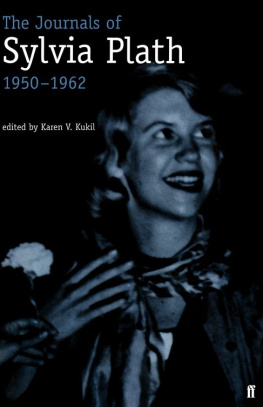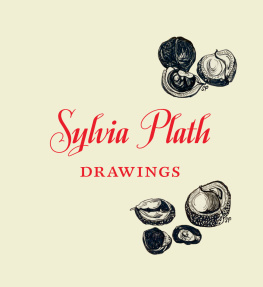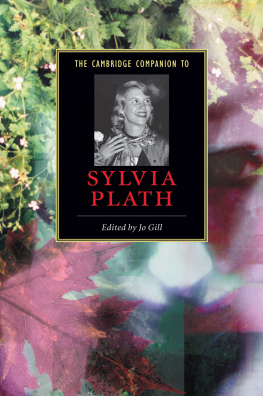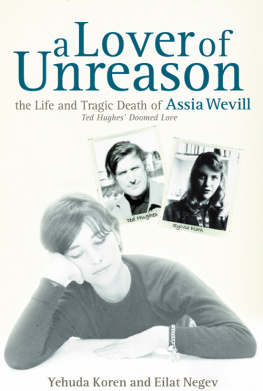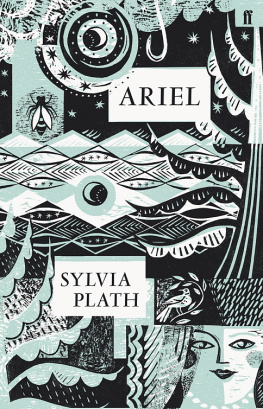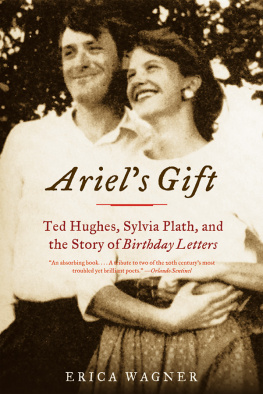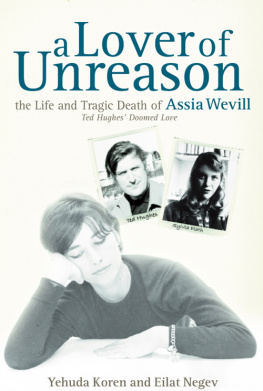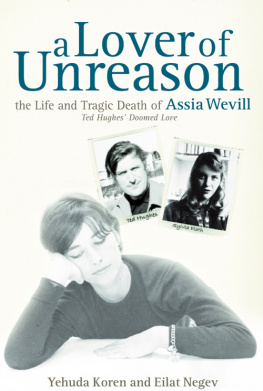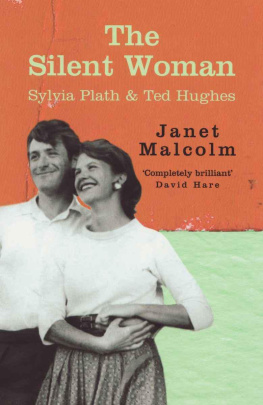RECLAIMING ASSIA WEVILL
JULIE GOODSPEED-CHADWICK
RECLAIMING ASSIA WEVILL
SYLVIA PLATH, TED HUGHES,
AND THE LITERARY IMAGINATION

LOUISIANA STATE UNIVERSITY PRESS
BATON ROUGE
Published by Louisiana State University Press
Copyright 2019 by Louisiana State University Press
All rights reserved
Manufactured in the United States of America
First printing
DESIGNER: Mandy McDonald Scallan
TYPEFACE: Whitman
PRINTER AND BINDER: Sheridan Books, Inc.
Cataloging-in-Publications Data are available from the Library of Congress.
ISBN 978-0-8071-7056-4 (cloth: alk. paper) ISBN 978-0-8071-7227-8 (pdf) ISBN 978-0-8071-7228-5 (epub)
The paper in this book meets the guidelines for permanence and durability of the Committee on Production Guidelines for Book Longevity of the Council on Library Resources. 
For Keith Chadwick,
Josephine Barbara Jean Chadwick,
and Jude Valentine Chadwick
CONTENTS
ACKNOWLEDGMENTS
My profound gratitude lies with my prepublication readers. I am grateful to James W. Long and others, including the specialist outside reader who expertly straddles Plath studies and Hughes studies, making any perceived divide nonexistent. You made this book the best it could be. Also of especial note are Marcia Eppich-Harris, Jay R. Howard, Nicholas Lawrence, and Peter K. Steinberg, among other first readers of this book. Your generosity and liveliness of mind and spirit ensured that this work was conducted in the most advantageous of circumstances. You are my readers, colleagues, and friends; while I am thankful for your collegiality, I am thankful for your friendship most of all. I am grateful to Eilat Negev and Yehuda Koren for reviewing the manuscript but also for their collegiality, congeniality, generosity, and expertise.
My admiration and thanks belong to Louisiana State University Press and the stellar people associated with it. You produce and champion beautiful and important books at a time when scholarly publishing needs support. It is an honor to be one of your authors. James W. Long deserves to be acknowledged twice: he is superlative. Thank you to the brilliant freelance editor Elizabeth Gratch for lending her expertise to this book. Thank you to Lee C. Sioles for her unparalleled work and artistry with production. Special thanks to Catherine L. Kadair for her superb work.
Thank you to the Estate of Assia Wevill for its support in the way of approval and permissions to work with and feature materials authored by Assia. It is a privilege to have your support.
I thank David Wevill for our correspondence and for permission to work with photographs he took of Assia.
I wish to thank the outstanding Courtney Chartier, Kathleen Shoemaker, and the staff of the Stuart A. Rose Manuscript, Archives, and Rare Book Library at Emory University. You are magnificent, and your graciousness is remarkable. I am grateful for access to the treasures housed in the Ted Hughes archive and for the help provided by the terrific staff of the Rose Library during my extended visits in 2016 and 2018.
Thank you to the Lilly Library at Indiana University for accommodating my requests to read materials and view artifacts in the Sylvia Plath archive in 2016 and 2018. Thank you, too, for accommodating my students visit; the Plath archival materials are riches indeed.
The University Library of Columbus earns my deep appreciation. Every item I needed could be secured, including rare books and materials. Thank you also for your outstanding work with interlibrary loan, especially concerning unusual requests, and for your support of research in the humanities. The University Library of Columbus is a truly impressive resource.
Thanks also to the IndianapolisMarion County Public Library, which is a community good that deserves accolades. Every book I requested for this project was secured, and the library goes to great lengths to cultivate an impressive collection of books for its readers.
This project was funded by a 201516 New Frontiers Exploratory Travel Fellowship from Indiana University Bloomington (IU) and by faculty development funds from Indiana UniversityPurdue University Columbus (IUPUC). Thanks are due George Towers, who supported my sabbatical, and this work specifically, including providing support for a travel fellowship, overseas conference travel, and faculty development funds. I am indebted to him. Vicki Kruse aided the research of this book in purchasing materials for it and in providing other necessary support, and I am grateful for her help, skill, and talents. Thanks, too, to my IUPUC colleagues-turned-friends at large for collegiality and friendship. Also, I thank Feminism Club at IUPUC and its community partners; they continually remind me of the importance of work, such as this study, in the world outside of academic scholarship.
I must respectfully thank several others: my aforementioned Division Head George Towers; Reinhold Hill, Vice Chancellor and Dean of Indiana UniversityPurdue University Columbus; Kathy Johnson, Executive Vice Chancellor and Chief Academic Officer at Indiana UniversityPurdue University Indianapolis (IUPUI); and Nasser Paydar, Chancellor of Indiana UniversityPurdue University Indianapolis and Executive Vice President of Indiana University, all of whom are advocates for faculty rights and supporters of high-quality faculty work in all areas, including humanities scholarship. These people make IUPUC-IUPUI a great place to be.
Special acknowledgment and thanks go to the IUPUI Office of the Vice Chancellor for Research for its strong support of this research. Special thanks are due Steven B. Chin, who lent his expertise and brilliance to this project; I thank him for his efforts in working with me to identify and apply for funding in connection with this project.
Thank you to the IU Office of the Vice President for International Affairs for funds that allowed me to travel overseas to present work and learn from others in connection with the material of this book.
Also, my students at Indiana UniversityPurdue University Columbus deserve recognition: over the years, I have learned from them, and as a result, I am a better teacher and scholar as time progresses. The students who took Sylvia Plath Studies during the fall 2016 semester shared my enthusiasm for Plath studies, and they cocreated the spaces in our service learning course within which we could engage in the study of texts, people, and concepts that showcase the real-world importance of literature. Thank you, Amanda Ballard, Bailey Burnett, Emily Pedigo, Alicca Rice, Melissa Sinclair, and Courtney Watkins. Thank you, too, to Brandi Rund, Clayton Ham, Seth Kerr, and the other students from the Introduction to Poetry course in spring 2017 for discussions that demonstrate how Plaths poetry resonates with twenty-first-century readers.
For professional community and its rewards, I am grateful to Kathleen Connors for codirecting the Sylvia Plath Symposium at Indiana University in 2012 and to Maeve OBrien for her leadership in organizing the Sylvia Plath: Letters, Words and Fragments Conference at Ulster University in Belfast, Northern Ireland, in 2017. To Plath scholars and biographers around the world, you make Plath studies important, exciting, and rewarding, and I am proud to be counted as one of you. In this vein, I am inspired by the exemplary scholarship, efforts, and friendship of many Plath scholars. Among others, thank you to Janet Badia, Heather Clark, Gail Crowther, Amanda Golden, Karen V. Kukil, Carl Rollyson, Peter K. Steinberg, David Trinidad, and Emily Van Duyne for creating new vistas for vibrant research and for your conversations about Plath and her circle with me (and my students). For his discerning work on Assia, I am indebted to Jonathan Bate; thank you, too, to Hughes scholars who produce impressive work and who exhibit generosity in their interactions with other scholars. As for primary work, I remain impressed by the power, resonance, and significance of Frieda Hughess poetry and paintings. Regarding work on Assia, I am in awe of the biography produced by Yehuda Koren and Eilat Negev. In similar fashion, I wish to acknowledge Kristie F. Fleckenstein, Sr. Stella Gampfer, Deborah M. Mix, Rai Peterson, and Diane Prenattthank you for the example you set for me.
Next page

